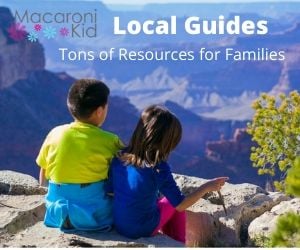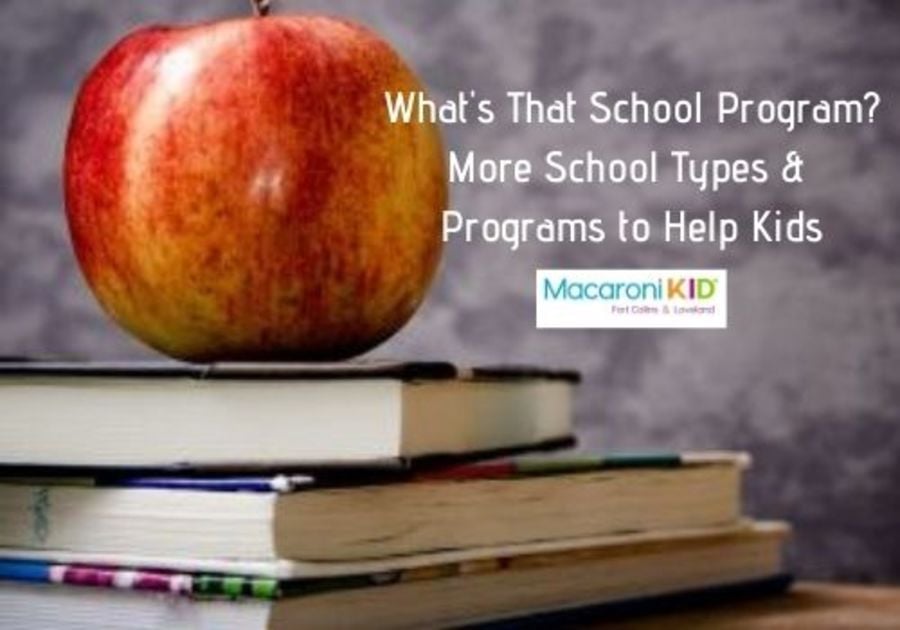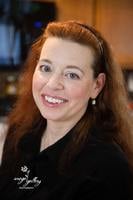No Matter What Level Your Kids Are At,
There are a ton of programs in schools to help kids
get to the next level and to help them soar.
Here are a few and what they do!
AP or Advanced Placement -
Most kids get their chance to enroll in AP classes in their junior year in high school. These courses provide students the opportunity to take college level courses and exams while still in high school.These classes use the same curriculum, text and requirements as taught in under graduate courses in universities. Credits are earned just like college.
AVID or Advancement Via Individual Determination -
AVID is an elective program for 7th through 12th grade to help with mid-range achieving students. This is not for high end or low end achievers. AVID is a college readiness system designed to increase a students learning and performance. It helps students think more critically and fill the gaps that may be keeping them from progressing. By refining their skills in writing, inquiry, collaboration, organization, and reading AVID helps students get a leg up on college skills that most don't get till they are in college. An example is where students take notes in their core classes and bring a POC or Point of Confusion to the AVID class. This helps the AVID staff create small study groups. These small groups collaborate and ask critical questions to work out the POC. More on AVID here.
Alternative Programs- schools -
These schools are designed to give specific instruction different from the traditional public school program. They are usually designed for students who have not been successful in regular schools, often due to behavior, disciplinary and safety concerns. An alternative school may involve a range of different educational settings other than the typical school. Alternative schools are frequently used as an alternative to expulsion and suspension. That being said, some alternative schools are for students who simply don't learn the traditional public school way.
Art And Technology Schools or programs -
Art and Technology schools teach with rich focus on communication through the arts and technology along with standard curriculum. These schools deliver their lessons through a focus on art, and technology using visual, literacy, and performing arts projects along with technology.
Bilingual or Dual Language Immersion -
Schools with Dual or Bilingual focus split their academic teachings into a primary language and a secondary language. Usually the primary language is the main language of the country the school is in and the secondary language is a chosen language that will help the student with future goals. Examples are Mandarin, Oriental, Spanish, English, Latin etc. The regular curriculum is delivered in the 2 languages.
Charter Schools -
Charter Schools are publicly funded but operate with their own missions and focus. They provide a unique educational opportunities and focus. They follow the state academic standards along side specialties such as an art or classical focus for example.
Concurrent Enrollment or Dual Enrollment -
This is just what it sounds like. A student will be enrolled 2 schools at the same time most commonly, High School and College at the same time. This allows the student to begin earning credits while in high school. Also similar to AP classes but can be at the college campus too.
Core Knowledge -
Core Knowledge is a curriculum of topics studied from Preschool through 8th grades. Standard lessons include Language arts, World history, American history,Geography, Visual arts, Music, Mathematics and Science. Based on the concept of building on what a child knows and builds year after year.
EL or Expeditionary Learning -
EL is designed for K through 12. The curriculum is nontraditional hands on, experience based learning. They go on learning expeditions both for immediate projects and long term study. Teaching style is described as active teaching, differentiation, and community service focused. The EL model is an academic application of Outward Bound. Students engage in in-depth study of compelling subjects with groups and on their own. Assessments are based on cumulative projects, public presentations, and portfolios. EL schools are designed to teach students the principles of self-discovery, having wonderful ideas, responsibility for learning, empathy and caring, success and failure, collaboration and competition, diversity and inclusion, the natural world, solitude and reflection, and service and compassion.
IB or International Baccalaureate -
IB World School simply has an International Baccalaureate status. What is that? These schools follow an accelerated curriculum developing international minded learners and leaders guided to make a positive difference in the world. The students are guided to think critically, construct their own meaning, and be reflective of their learning. College credits can be acquired by High School Students after taking the IB exam.
LiM or Leader in Me -
Developed in partnership with educators, it is an evidence-based comprehensive school improvement model that empowers students to find the leader within. Based on Stephan Covey's book The 7 Habits of Highly Effective People.
Magnet Lab School -
Traditional curriculum for K - 8 empowers it's students and believes all students deserve to have access to science, technology, engineering and mathematics (STEM education). Students have opportunities to demonstrate their abilities in various ways.
Online Hybrid Learning -
This is a good fit for students who work well on their own with instruction outside of the traditional classroom. There are many options at Elementary, Middle School, High School and beyond. These schools have various core values as they range range from colleges to school districts. There are a wide variety of schools online and supplemental subject specific educational tutoring and education available for all ages.
Private Schools or Independent Schools -
These schools are funded through private funds such as tuition. Their missions vary and can offer a wider range of curriculum than the standardized education.
Project Based Learning -
Instructional learning with an authentic learning experience which naturally engage student interest and motivation. Studies are centered around projects designed to acquire a deeper knowledge through active exploration of real world challenges and problems.
Science, Technology, Engineering, (Art) and Math -
STEM or STEAM are grounded in standards based curriculum, these programs incorporate problem solving, critical thinking, scientific reasoning, inquiry and innovation into the application of learning. These lessons are based in Science, Technology, (Art) and Math.
Before and After School Programs -
These are programs that not only keep your kids safe during the time between parents drop off and pick up kids from school but they have an educational side too. Many schools have these programs already and you don't have to search for any. There are some that are independent of public schools. Some examples are ASK or 1st Choice After School Kare, B.A.S.E. Camp, Champions, Kid's Corner, R Youth Team, Boys and Girls Club, and YMCA to name a few.
Gifted and Tallented -
This is a great way for kids who excel to express themselves and grow. Programming options and support services designed to help meet the academic and social/emotional needs of our gifted and talented students are available at each school. Additional district-sponsored opportunities include the Resource Enrichment Center (a lending library of resources for parents, students and teachers—see information online at Gifted & Talented Library) and enrichment opportunities such as Destination ImagiNation, Shadows in the Arts, Robotics, District Spelling Bee, District Chess Tournament, and Middle School Math Counts.
Ignite -
Ignite offers one-day STEM camps that meet on select district professional days when students are not in school.
Ignite offers students an engaging day of hands-on learning that explores an array of STEM careers. Each camp is laced with a variety of opportunities to ignite curiosity, passion and learning in every student. Camps are conveniently located at district middle schools and serve grades K-5. Go to thompsonschools.org/Ignite for more information.
Extracurricular Enrichment -
Educational enrichment programs align with curriculum taught in the classrooms. Students that participate in enrichment programs work on and investigate an area of interest more in depth. Some programs offered include Chess, Destination ImagiNation, Math Counts, Math Olympiads, Robotics, Spelling Bee, and Battle of the books.
Early Education Programs -
Head Start -
The Head Start Program provides services to children who are 3 or 4 years old as of October 1 of the current year. Children are enrolled in classrooms with developmentally appropriate curriculum and provided with nutrition, health and family support services. To be eligible, children must meet federal income and program guidelines.
Colorado Preschool Program -
The Colorado Preschool Program provides services to children who are 3 or 4 years old as of October 1 of the current year. This program is funded by the state of Colorado to prepare children for success in school. To be eligible, children must have risk factors such as eligibility for free and reduced lunch, a history of frequent moves, an impact from drug and/or alcohol abuse, etc.
Special Needs -
Special Needs service options are available to children who meet federal and state guidelines for special education help in developmental areas. Children who meet these guidelines are eligible for services as of their third birthday. Services will be provided in a classroom setting.
Special Education -
IEP, FAPE, 504, Medicaid, IDEA and ECEA information -
The Term "special education" covers a lot. It is specifically designed instruction at no cost to parents to help meet each individual unique need of each child who are identified with disabilities in accordance with the Individuals with Disabilities Education Act or IDEA and the state regulations exceptional childrens education act or ECEA.
A special education evaluation is needed to determine the needs of the student and includes a variety of individualized assessments administered to a child and/or the use of a Response to Intervention (RtI) model, but only after parents have given informed written consent. This evaluation includes assessment results, including data from interventions, that will lead to the most complete understanding of the student's unique educational needs.
A meeting will be held with the parents, teachers and those who conducted assessments to determine if the child has an educational disability and is eligible to receive special education services. If a disability is identified, an Individual Education Plan (IEP) will be developed to ensure the student receives a free, appropriate public education (FAPE).
Section 504 of the Rehabilitation Act of 1973 (Section 504) is a civil rights statute that protects persons with disabilities from discrimination. It states that “no otherwise qualified individual with a disability shall solely by reason of his or her disability be excluded from the participation in, be denied the benefits of, or be subjected to discrimination under any program or activity receiving federal financial assistance.” The Americans with Disabilities Act (ADA) contains similar prohibitions against discrimination.
In 1988 the U.S. Congress passed legislation enabling school districts to access Medicaid funds for health-related services provided to children. Such services include but are not limited to: health assessments and evaluations, nursing services, speech, occupational and physical therapy, and psychological or social work services as part of an individual student's educational or health plan.
What is an IEP?
The Individualized Educational Plan (IEP) is a plan or program developed to ensure that a child who has a disability identified under the law and is attending an elementary or secondary educational institution receives specialized instruction and related services
What is a 504 Plan?
The 504 Plan is a plan developed to ensure that a child who has a disability identified under the law and is attending an elementary or secondary educational institution receives accommodations that will ensure their academic success and access to the learning environment.
Differences between IEP & 504 (in a nutshell)
Not all students who have disabilities require specialized instruction. Students with disabilities requiring specialized instruction, the Individuals with Disabilities Education Act (IDEA) controls the procedural requirements, and an IEP is developed. The IDEA process is more involved than that of Section 504 of the Rehabilitation Act and requires documentation of measurable growth. Students with disabilities who do not require specialized instruction but need the assurance that they will receive equal access to public education and services, a document is created to outline their specific accessibility requirements. Students with 504 Plans do not require specialized instruction, but, like the IEP, a 504 Plan should be updated annually to ensure that the student is receiving the most effective accommodations for his/her specific circumstances.
Homebound Services -
Homebound instruction is available to students between the ages of three and twenty-one who have not graduated from high school. These services are provided when a student cannot attend school for greater than three weeks due to an extended illness or condition, for a brief recuperative period of time after giving birth, or as a special education placement determined by an IEP team.
Safe 2 Tell Colorado -
If you feel that your student has been a victim of bullying, please report your concern, orally or in writing, to any teacher or member of the school administration. Procedures provide students the opportunity to anonymously report acts of bullying to teachers and administrators; parents/guardians may file anonymous reports of suspected bullying as well. “Safe2Tell Colorado” allows individuals to anonymously leave a tip.
Summer Programs
Camp READ -
Normally an invitation is sent to parents for kids who are behind in reading or struggling with the quality of reading though anyone can go. Kids with need have priority. This camp is for kids in elementary and runs all summer. Registration generally begins in March.
Middle School Summer Skills -
Project-Based Experiences: For students exiting 6th through 8th grade seeking additional opportunities to develop math and literacy skills. They will be able to participate in project-based experiences that have integrated literacy and math skills in a variety of content areas. Registration generally begins in March.
FUELED Credits over the summer for High School -
Students can get credits they need to catch up or to get ahead through FUELED. Registration generally begins in March.
SAM or Summer Academy Music -
Grades 6-8 Choir, Beginning Band, Middle and Advanced Band, Jazz, High School Band, Orchestra, High school or advanced Orchestra. Registration usually begins in March and runs through early July. Classes run one week in Mid July.
English Language Development -
Helping kids develop a stronger grasp of the English language.
Robotix Summer Camp -
For the tech kid. Experience technology and create this summer.
I hope this helps and gives a basic insight of the various programs.
 |  |  |  |



